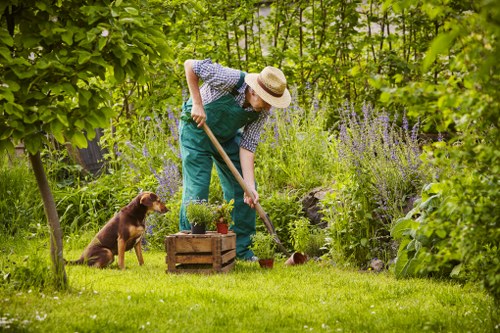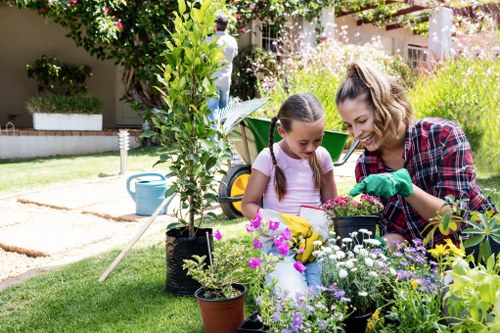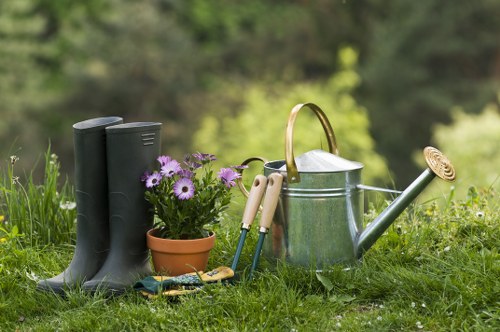Landscape Gardening in Regents Park: Transforming Urban Spaces into Green Oases

Introduction to Landscape Gardening in Regents Park
Regents Park, one of London's most iconic green spaces, offers a stunning backdrop for landscape gardening enthusiasts. Transforming these urban areas into lush, vibrant gardens not only enhances the aesthetic appeal but also provides a sanctuary for both residents and visitors. Whether you're a seasoned gardener or a novice, understanding the nuances of landscape gardening in Regents Park can help you create a harmonious and sustainable environment.
Landscape gardening involves the thoughtful arrangement of plants, water features, pathways, and other elements to create a cohesive and inviting outdoor space. In Regents Park, the challenge lies in balancing the historical significance of the park with modern gardening techniques to maintain its beauty and functionality.
In this article, we will explore various aspects of landscape gardening in Regents Park, including design principles, plant selection, maintenance tips, and the integration of sustainable practices. By the end, you'll have a comprehensive understanding of how to create and maintain a beautiful garden in this prestigious location.

Design Principles for Landscape Gardening
Effective landscape gardening begins with a solid design plan. In Regents Park, where space can be limited, it's crucial to maximize every inch to create a balanced and functional garden. Here are some key design principles to consider:
Balance and Symmetry
Achieving balance in your garden ensures that no single element overwhelms the space. Symmetrical designs are popular in formal gardens, creating a sense of order and harmony. Asymmetrical designs, on the other hand, can offer a more natural and relaxed feel.
Focal Points
Incorporating focal points, such as a beautiful tree, a water feature, or a striking arrangement of flowers, can draw the eye and add interest to your garden. These elements serve as anchors, around which other components of the garden can be organized.
Scale and Proportion
Consider the scale of your plants and garden features in relation to the overall space. In Regents Park, where gardens range from expansive lawns to intimate flower beds, maintaining appropriate proportions is essential for visual harmony.
Color Schemes
Choosing the right color palette can significantly impact the mood and appearance of your garden. Harmonious color schemes can create a serene environment, while contrasting colors can add vibrancy and energy.
Texture and Variety
Incorporating a mix of textures through different plant types and garden materials adds depth and interest. Combining broad-leafed plants with fine-leafed ones, or smooth stones with rough bark, can enhance the sensory experience of your garden.
By adhering to these design principles, you can create a landscape garden in Regents Park that is both aesthetically pleasing and functional.

Plant Selection for Regents Park Gardens
Choosing the right plants is fundamental to successful landscape gardening. In Regents Park, the climate, soil conditions, and seasonal variations must be considered to ensure plant health and longevity. Here are some tips for selecting suitable plants:
Native Plants
Incorporating native plants is beneficial as they are well-adapted to the local climate and soil conditions. They require less maintenance, are more resistant to pests, and support local wildlife, contributing to biodiversity in Regents Park.
Perennials vs. Annuals
Perennials provide long-term structure and continuity in the garden, blooming year after year. Annuals, while temporary, offer vibrant color and can be rotated to introduce variety each season.
Shade and Sun Tolerance
Understanding the light conditions in different parts of Regents Park is crucial. Select plants that thrive in the specific light levels of your garden areas, whether full sun, partial shade, or full shade.
Seasonal Interest
Choose plants that offer interest throughout the year, including spring blooms, summer foliage, autumn color, and winter structure. This ensures your garden remains attractive in all seasons.
Height and Growth Habits
Consider the mature height and growth habits of plants to create a layered effect. Taller plants can serve as background elements, while shorter ones can be used as ground cover or accents.
By carefully selecting plants suited to Regents Park's environment, you can create a resilient and beautiful garden that flourishes throughout the year.

Paths and Hardscaping Elements
Paths and hardscaping elements play a crucial role in landscape gardening by providing structure, directing movement, and adding visual interest. In Regents Park, where space is at a premium, thoughtful placement of these elements can enhance both functionality and aesthetics.
Pathway Design
Paths guide visitors through the garden, offering access to different areas and highlighting key features. Materials commonly used include gravel, paving stones, and decking. Choose materials that complement the overall garden design and are durable for heavy foot traffic.
Seating Areas
Incorporating seating areas, such as benches or gazebos, provides places for relaxation and enjoyment of the garden. Position these spaces in areas with scenic views or near focal points to maximize their appeal.
Water Features
Water features, such as fountains, ponds, or streams, add a sense of tranquility and can become a central focus in the garden. Ensure that water features are well-maintained and integrated harmoniously with the surrounding landscape.
Garden Lighting
Strategic lighting enhances the beauty of the garden at night and improves safety along pathways. Use a combination of ambient, task, and accent lighting to highlight key areas and create a welcoming atmosphere.
Boundary Walls and Fencing
Boundary walls and fencing can define the garden space, provide privacy, and support climbing plants. Choose materials and styles that blend seamlessly with the overall garden design.
Effective use of paths and hardscaping elements can elevate the overall design of your landscape garden, making Regents Park a more inviting and enjoyable place for everyone.

Maintenance Tips for Regents Park Gardens
Maintaining a landscape garden requires regular care and attention to ensure it remains healthy and visually appealing. In Regents Park, where gardens are subject to heavy foot traffic and environmental factors, consistent maintenance is essential.
Watering and Irrigation
Proper watering is vital for plant health. Install an efficient irrigation system to provide consistent moisture, especially during dry spells. Consider rainwater harvesting systems to make your garden more sustainable.
Pruning and Trimming
Regular pruning helps shape plants, remove dead or diseased branches, and promote healthy growth. Timely trimming ensures that plants do not become overgrown and maintains the intended design of the garden.
Weeding and Mulching
Weeds compete with desired plants for nutrients and water. Regular weeding keeps the garden tidy and reduces the need for chemical herbicides. Applying mulch helps retain soil moisture, suppress weeds, and enhance the garden's appearance.
Pest and Disease Management
Monitor plants regularly for signs of pests and diseases. Implement integrated pest management (IPM) practices to control issues sustainably, minimizing the use of harmful chemicals.
Soil Health
Healthy soil is the foundation of a thriving garden. Test soil regularly and amend it with organic matter, such as compost, to improve fertility and structure.
By adhering to these maintenance practices, your landscape garden in Regents Park will remain vibrant and resilient, providing beauty and enjoyment for years to come.

Sustainable Practices in Landscape Gardening
Sustainability is increasingly important in landscape gardening, and Regents Park is no exception. Implementing eco-friendly practices not only benefits the environment but also enhances the garden's resilience and reduces maintenance efforts.
Native Plant Integration
As mentioned earlier, native plants are well-suited to the local environment, requiring less water and fewer resources. They also support local wildlife, promoting biodiversity and ecological balance.
Efficient Irrigation Systems
Using drip irrigation and smart watering systems ensures that plants receive the right amount of water without wastage. Timers and sensors can optimize water usage based on weather conditions and soil moisture levels.
Composting and Waste Reduction
Composting kitchen scraps and garden waste creates a valuable resource for enriching the soil. Reducing waste not only conserves resources but also minimizes the garden's environmental footprint.
Permeable Surfaces
Incorporating permeable materials for pathways and hardscaping allows rainwater to seep into the ground, reducing runoff and promoting groundwater recharge.
Renewable Energy Sources
Utilizing solar-powered lighting and water features can reduce the garden's reliance on non-renewable energy sources, contributing to a more sustainable landscape.
Embracing sustainable practices in your landscape gardening efforts ensures that Regents Park remains a green and thriving space for future generations.

Seasonal Gardening in Regents Park
Understanding the changing seasons is crucial for successful landscape gardening. Each season offers unique opportunities and challenges that can influence your gardening strategies in Regents Park.
Spring: Planting and Renewal
Spring is a time of renewal, perfect for planting new flowers, shrubs, and trees. It's also an ideal period for pruning and preparing the garden for the upcoming growing season.
Summer: Maintenance and Enjoyment
During summer, focus on maintaining plant health through regular watering, weeding, and pest control. This season also offers the best conditions for enjoying the garden's full bloom and vibrant colors.
Autumn: Preparation and Cleanup
Autumn involves preparing the garden for winter by harvesting late-season crops, clearing fallen leaves, and protecting sensitive plants from frost. Mulching in autumn can help insulate the soil and retain moisture.
Winter: Protection and Planning
Winter requires protecting plants from harsh weather conditions. Use protective coverings for delicate species and plan for the next growing season by assessing what worked well and what needs improvement.
Winter Interest
Incorporate elements that provide visual interest in winter, such as evergreens, ornamental bark, and structural branches. These features can add texture and contrast when other plants are dormant.
By adapting your landscape gardening practices to each season, you can ensure that your garden in Regents Park remains healthy, beautiful, and resilient throughout the year.

Community and Landscape Gardening
Regents Park is not just a space for individual gardeners but also a vibrant community hub. Engaging with local gardening groups and participating in community projects can enhance your gardening experience and contribute to the park's overall beauty.
Collaborative Projects
Joining forces with other gardening enthusiasts allows for larger-scale projects, such as community flower beds, playground enhancements, and public art installations. These collaborative efforts foster a sense of ownership and pride among participants.
Workshops and Events
Participating in gardening workshops and events provides opportunities to learn new techniques, exchange ideas, and stay updated on the latest trends in landscape gardening. These events also offer a platform to showcase your garden and inspire others.
Volunteer Opportunities
Volunteering for park maintenance and improvement projects not only benefits the community but also deepens your connection to Regents Park. It's a way to give back while enjoying the therapeutic benefits of gardening.
Sharing Knowledge
Sharing your gardening experiences and expertise with others can help build a supportive community. Whether through informal gatherings or organized seminars, exchanging knowledge enriches everyone's gardening journey.
Access to Resources
Community gardening initiatives often provide access to shared resources, such as tools, seeds, and compost, making it easier to maintain your garden without significant individual investment.
Embracing the communal aspects of landscape gardening in Regents Park fosters a collaborative spirit and enhances the overall gardening experience for everyone involved.

Integrating Technology in Landscape Gardening
Modern technology offers numerous tools and innovations that can enhance landscape gardening. Integrating these advancements into your Regents Park garden can improve efficiency, sustainability, and overall garden health.
Smart Irrigation Systems
Smart irrigation systems use sensors and automated controls to deliver precise amounts of water based on real-time weather data and soil conditions. This technology conserves water and ensures optimal hydration for your plants.
Garden Management Software
Utilizing garden management software allows you to track plant health, schedule maintenance tasks, and manage resources effectively. These tools can streamline garden operations and aid in long-term planning.
Solar-Powered Features
Incorporating solar-powered lighting and water features reduces energy consumption and lowers utility costs. Solar technology also adds an eco-friendly aspect to your garden design.
Drone Technology
Drones can be used for monitoring large garden areas, assessing plant health, and even assisting in planting and maintenance tasks. This technology provides a bird's-eye view, helping identify issues that may not be visible from the ground.
Automated Maintenance Tools
Robotic lawn mowers and automated pruning tools can reduce the time and effort required for routine maintenance, allowing gardeners to focus on more creative aspects of landscape gardening.
By embracing technological innovations, landscape gardeners in Regents Park can enhance the efficiency, sustainability, and overall success of their gardens.

Conclusion: Embracing the Beauty of Regents Park Through Landscape Gardening
Landscape gardening in Regents Park is a rewarding endeavor that combines creativity, sustainability, and community spirit. By applying thoughtful design principles, selecting appropriate plants, maintaining your garden diligently, and embracing modern technologies, you can transform urban spaces into lush, vibrant oases.
Whether you're enhancing a private garden or participating in community projects, your efforts contribute to the enduring beauty and ecological health of Regents Park. A well-tended garden not only enriches your personal experience but also provides a serene and inviting environment for all who visit.
Ready to transform your outdoor space? Contact us today to start your landscape gardening journey in Regents Park. Let our expertise help you create a garden that is both beautiful and sustainable.
Book your service now and take the first step towards a greener, more vibrant Regents Park.